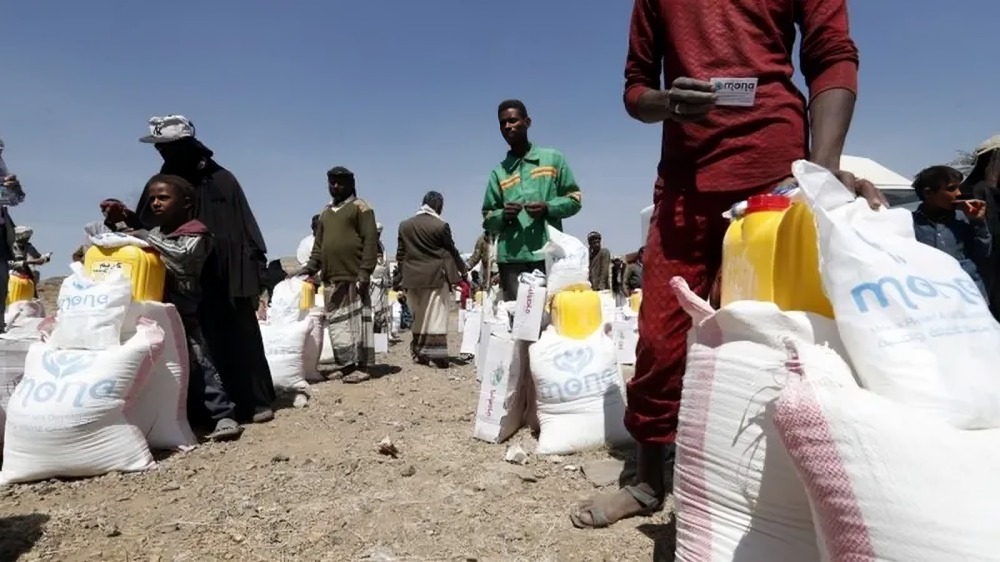


Barran Press
The United States Agency for International Development (USAID) reaffirmed its commitment to providing humanitarian aid to Yemen, including areas under the control of the Houthi rebels, on Sunday, July 28th, 2024.
The agency stated that humanitarian assistance plays a crucial role in mitigating food insecurity across Yemen.
In a report monitored by "Barran Press," USAID highlighted the challenges faced by families in government-controlled areas due to rising food prices and the depreciation of the Yemeni rial, making it difficult for them to afford basic food items.
Despite the availability of food in markets and a 22% increase in overall food imports through Yemeni seaports during the first five months of 2024 compared to the same period in 2023, the agency acknowledged the ongoing food insecurity.
USAID pledged to continue its aid distribution, even in areas controlled by the Houthis, who have escalated arrests of international organizations and UN agency staff. The agency has already provided assistance to over 1.3 million Yemenis through partner organizations.
The report detailed the various forms of aid being provided, including emergency food distributions, cash and voucher programs for purchasing food in local markets, and multi-purpose cash assistance for addressing basic needs.
Despite the suspension of the World Food Program's general food assistance program in Houthi-controlled areas, USAID partners continue to distribute food and other multi-sectoral support, including health services, nutrition programs, and water, sanitation, and hygiene initiatives.
The agency also emphasized the ongoing monitoring of the situation in Yemen in coordination with the international community and the United Nations.
The report highlighted the alarming rise in food insecurity across Yemen, particularly in Houthi-controlled areas, where the rate of inadequate food consumption has increased by 78% year-on-year, compared to a 52% increase in government-controlled areas.
USAID reiterated that humanitarian aid remains critical in alleviating food insecurity across Yemen, acknowledging the impact of rising food prices and the depreciating rial on the ability of families in government-controlled areas to purchase essential food items.
The agency concluded by emphasizing the importance of addressing the underlying factors contributing to food insecurity, including the ongoing conflict, economic deterioration, and limited livelihood opportunities.
Health Deterioration:
The report indicated that nearly a decade of conflict in Yemen has led to a surge in infectious diseases, including diphtheria, measles, polio, and vector-borne illnesses like dengue fever and malaria. As a result, the country faces a resurgence and rise in vaccine-preventable diseases, particularly among children.
The report attributed this trend to displacement, economic deterioration, declining incomes, overcrowded living conditions in displacement camps, a strained healthcare system, and low immunization rates.
Food Insecurity and Rising Costs:
The cost of the minimum food basket, containing essential caloric requirements for a family for a month, including beans, oil, rice, salt, sugar, and wheat, has reached approximately $70, representing a 13% increase from the previous year.
Humanitarian Workers Held Hostage:
The USAID report also addressed the detention of humanitarian workers by the Houthis, including former employees of the agency itself and the US embassy in Sana'a.
The agency stated that since June, the Houthis have detained at least 13 UN staff members. The report suggested that the actual number of detained NGO staff could be significantly higher, as national NGOs are less likely to report detentions due to security concerns related to their association with the UN.
Israeli Airstrikes on Hudaydah Port:
The report further addressed recent Israeli airstrikes on the port of Hudaydah (northern Yemen). According to international media reports, the strikes, launched on July 20 in retaliation for a Houthi drone attack on Tel Aviv on July 19, damaged fuel tanks, port infrastructure, and energy facilities.
The USAID report highlighted the strategic importance of Hudaydah port as a primary entry point for commercial imports and humanitarian aid, including food, fuel, and medicine. The port's capacity to handle large volumes of cargo and its proximity to population centers make it crucial for facilitating humanitarian assistance to those in need in Yemen.
Dependency on Imports:
The report emphasized Yemen's heavy reliance on imports to secure its food supply, making it vulnerable to supply disruptions and rising global prices. According to ACAPS reports, imports account for almost 90% of the country's staple grains. A February report by the UN Food and Agriculture Organization (FAO) indicated that 40% of logistics partners, heavily reliant on ports for importing humanitarian aid, used Hudaydah port as of July.